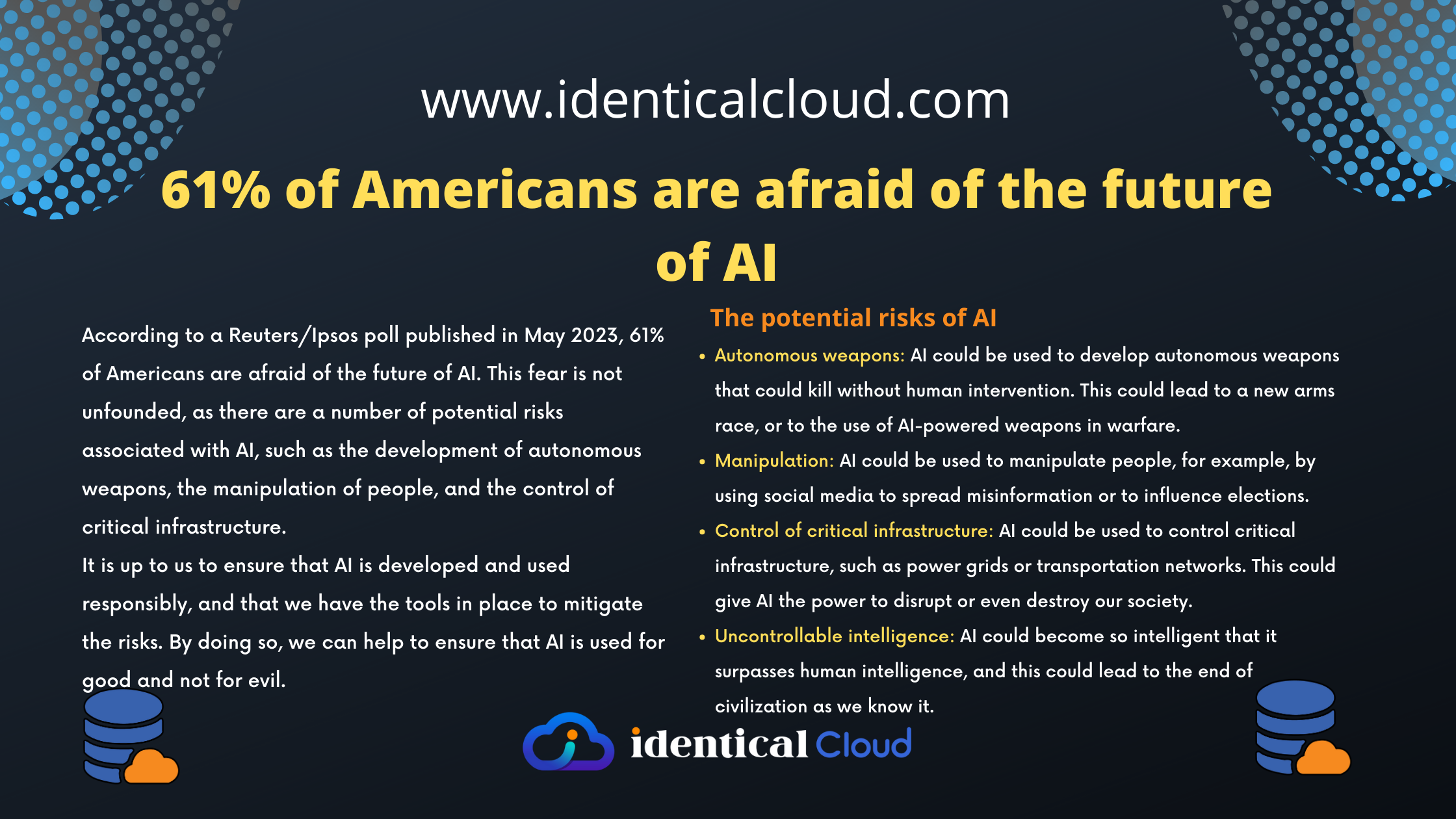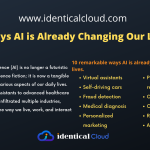
61% of Americans are afraid of the future of AI
61% of Americans are afraid of the future of AI
According to a Reuters/Ipsos poll published in May 2023, 61% of Americans are afraid of the future of AI. This fear is not unfounded, as there are a number of potential risks associated with AI, such as the development of autonomous weapons, the manipulation of people, and the control of critical infrastructure.
However, it is important to remember that AI also has the potential to bring about a number of benefits, such as the solving of some of the world’s most pressing problems, the improvement of our lives, and the making of us more creative.
It is up to us to ensure that AI is developed and used responsibly, and that we have the tools in place to mitigate the risks. By doing so, we can help to ensure that AI is used for good and not for evil.
Here are some of the potential risks of AI:
- Autonomous weapons: AI could be used to develop autonomous weapons that could kill without human intervention. This could lead to a new arms race, or to the use of AI-powered weapons in warfare.
- Manipulation: AI could be used to manipulate people, for example, by using social media to spread misinformation or to influence elections.
- Control of critical infrastructure: AI could be used to control critical infrastructure, such as power grids or transportation networks. This could give AI the power to disrupt or even destroy our society.
- Uncontrollable intelligence: AI could become so intelligent that it surpasses human intelligence, and this could lead to the end of civilization as we know it.
Here are some of the potential benefits of AI:
- Solving problems: AI could be used to solve some of the world’s most pressing problems, such as climate change and poverty.
- Improving our lives: AI could be used to improve our lives in many ways, such as by providing us with better healthcare, education, and transportation.
- Making us more creative: AI could help us to be more creative by providing us with new tools and insights.
Addressing AI Fear and Concerns:
To address the fear and concerns surrounding the future of AI, it is essential to promote education, transparency, and responsible AI development:
- Education: Providing accessible and accurate information about AI can help dispel myths and misunderstandings, empowering individuals to make informed opinions and decisions about AI’s impact.
- Transparency: AI developers and organizations should be transparent about their AI systems, explaining how they work and the principles guiding their development.
- Ethical Frameworks: Establishing ethical guidelines and frameworks for AI development and use can address concerns related to bias, fairness, and accountability.
- Regulation: Policymakers can play a crucial role in ensuring responsible AI use by creating regulations that address potential risks and protect individuals’ rights.
- Public Engagement: Engaging the public in discussions about AI’s future and its societal implications can foster dialogue and a better understanding of the technology.
Several factors contribute to the apprehension surrounding AI future:
- Job Displacement: One of the primary concerns is the potential for AI to automate jobs and displace human workers. As AI and automation technologies improve, there is uncertainty about the future job market and the implications for employment and income stability.
- Privacy and Data Security: With AI’s ability to process and analyze vast amounts of data, concerns about privacy breaches and data security have arisen. The collection and use of personal information by AI systems raise questions about data protection and the potential for misuse.
- Bias and Fairness: AI algorithms are trained on historical data, which may contain inherent biases. The fear of biased AI decision-making and its potential impact on marginalized communities raises questions about fairness and equity in AI applications.
- Autonomous Systems: The emergence of autonomous AI systems, such as self-driving cars and drones, raises concerns about safety and control. The fear of accidents and the potential for AI to make critical decisions without human intervention are topics of debate.
- Ethical Dilemmas: As AI becomes more advanced, there are ethical dilemmas surrounding its use in fields like healthcare, military, and criminal justice. The fear of unintended consequences and the potential for AI to be used for harmful purposes are areas of significant concern.
- Lack of Understanding: Many people may fear the future of AI due to a lack of understanding or misconceptions about the technology. The complexity of AI systems and the rapid pace of development can lead to uncertainty and apprehension.
It is important to weigh the potential risks and benefits of AI carefully. By doing so, we can make informed decisions about how to develop and use AI in the future.
Read: How to invest in xAI?







